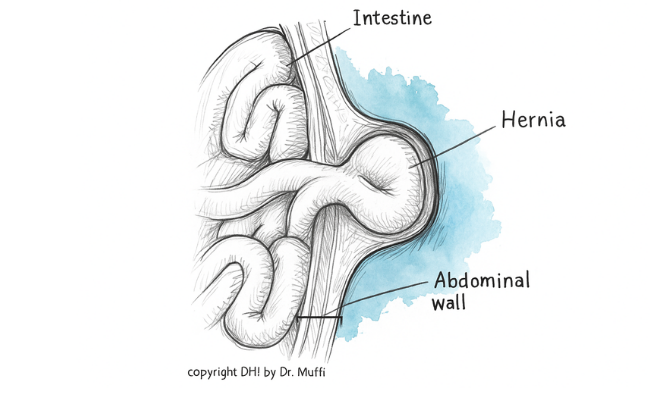Hernia Surgery
Introduction | Treatment | Recovery

What Is a Hernia?
A hernia happens when an internal organ or tissue pushes through a weak spot in the muscle or abdominal wall. It often causes a visible bulge and discomfort especially when coughing, lifting, or straining.
Hernias do not go away on their own and can become painful or dangerous if left untreated.
Common Types of Hernias
- Inguinal Hernia : In the groin area (most common)
- Umbilical Hernia : Near the belly button
- Hiatal Hernia : Part of the stomach pushes into the chest
- Incisional Hernia : At the site of a previous surgery
Signs & Symptoms
- A bulge under the skin (in the belly or groin)
- Pain or pressure at the site
- Discomfort when lifting, coughing, or standing
- Heartburn or acid reflux (in hiatal hernia)
- Nausea or vomiting in severe cases
Seek medical help if the pain gets worse or the bulge becomes firm and can’t be pushed in — this may be a sign of a strangulated hernia, which is an emergency.
Key Features:
Minimally invasive hernia repair using laparoscopic or robotic techniques, which means:
- Small incisions & quicker recovery
- Less pain and fewer complications
- Strong, long-lasting repair using mesh (if needed)
- Can be combined with bariatric surgery if appropriate
Is hernia surgery safe?
Yes. Hernia surgery is generally safe, especially in experienced hands. As with any surgery, risks include infection, bleeding, and recurrence, but these are rare with proper technique and care.
Will I have any restrictions after surgery?
Yes. You’ll be advised to:
- Avoid heavy lifting (5-6 kg) for 4–6 weeks
- Limit strenuous activity
- Walk and move gently to prevent blood clots
What's the typical recovery time after hernia surgery?
Recovery varies by hernia type and surgical method, but most people can return to light activities in a few days and resume normal activities within 2-6 weeks.




